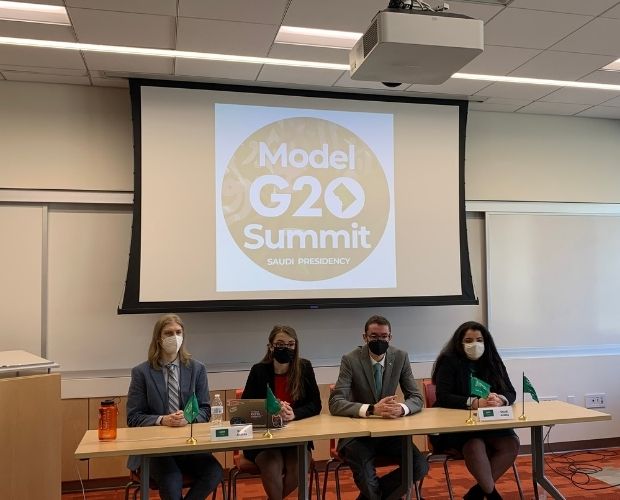SIS’s Model G20 Summit Adapts to the COVID-19 Pandemic
When the COVID-19 pandemic forced classrooms and offices online in March, SIS’s Model G20 also had to adapt. The G20 itself was born out of the 2008 global financial crisis, providing an informal place for the leaders of the world’s biggest economies to gather and find consensus on the most pressing issues of the time. Taking inspiration from its real-life counterpart, the Model G20 went online, with its staff spanning continents as they worked to put together a successful summit.
After an arduous planning process that lasted throughout the summer and fall, the summit was postponed from its usual dates in mid-October to March of 2021, when its theme of the Saudi Presidency could be simulated in full. The first (and hopefully, only) fully virtual Model G20 Leaders’ Summit adopted its communiqué on Sunday, March 14, concluding the Riyadh Summit and ushering in the 2021 Italian Presidency summit planned for October.
The History of the Model G20 Summit
The Model G20 Summit was first launched in 2016 by SIS professor Andrew Spath and Ambassador Cecilia Nahón, who previously served as the Argentine ambassador to the United States and represented Argentina in G20 negotiations. The first full summit of Model G20 was in 2017, where delegates simulated the German Presidency. Since this summit, the program has shown both proof of concept and high engagement with four successful weekend-long simulations, drawing participants from a variety of academic institutions, non-governmental organizations, and embassies.
The Model G20 Summit is focused on accuracy and realism, harnessing the involvement and leadership of diplomats and experts. Rather than viewing negotiation as a zero-sum game, participants are empowered to be extremely collaborative and consensus-focused in both formal and informal discussions. These unique attributes make the Model G20 Summit a valuable tool for building real skills for future diplomats.
The Saudi Presidency
The staff of Model G20 recognized the unique opportunity that the G20 was presenting to the world when Saudi Arabia took over the G20 presidency in 2020. This was one of the first times that a Middle Eastern country would be “chairing” an international forum. We also quickly began to realize the constraints we would have with running a virtual summit while trying to stay true to the core of what the G20 represented—informal discussion among world leaders.
With this, the leaders of the simulation came up with a set of topics that were both relevant to COVID-19 and also allowed for discussion on other global issues. These topics included human capital development, SME development and financial inclusion, supply chains, food and water security, energy, and health infrastructure. The conversation among delegates, while intimate, was robust and animated with a clear demonstration of knowledge regarding the issues facing each member and the globe. After this engaging dialogue, the participants drafted and edited the traditional consensus-based G20 document: a communiqué.
In addition to the negotiations, delegates had the unique opportunity to hear about Saudi Arabian priorities through remarks from Fahad Nazer, the official spokesperson for the Embassy of the Kingdom of Saudi Arabia.
Toward the Rome 2021 Summit
As COVID-19 vaccines are produced and distributed around the world, the Model G20 is anxiously anticipating its 2021 Rome Summit. The summit is scheduled to take place in October at the School of International Service, following any university and DC health and safety guidelines. Looking forward, the Model G20 Summit leaders are excited to further refine the simulation, add new members to the robust and talented student staff, expand partnerships within and outside of the AU community, and help another cohort of talented participants build skills for future careers in diplomacy.
We are currently accepting applications for our student staff to help us make Model G20 the best it can be in 2021. We have positions open involving everything from writing policy briefs to designing summit materials and doing outreach with embassies, so students of all schools, years, and interests are encouraged to apply!

